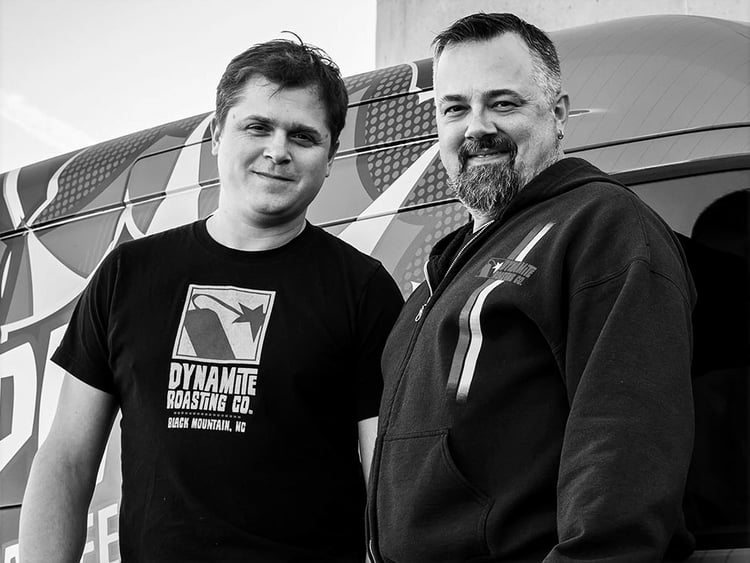It is nearly unnecessary for Andy Gibbon of Dynamite Roasting Company to speak his story – his smile, his eyes, say it all. He loves people. Community. Music, and of course, Coffee. When we do sit down to chat all things Dynamite, the lack of hesitation to find his words displays a man who lives his life fully with passion and purpose. He can matter-of-factly tell the detailed journey of a bean from crop to cup (from the subtle nuances found in each type of bean, to the complex protocol they have developed that makes their roasting style unique). He fully understands the mutually-beneficial business transactions that bring the beans from hand-picked farms to Dynamite’s new, 8,000 square foot roastery in Swannanoa, NC where their specialized style of roasting has made their brand famous. It becomes clear: it is not necessary for one to live a big city life to fulfill world-class dreams. And also clear: you do not need to travel to far-away lands to experience their flavor: Andy brings it home to you. I am speaking of what looks like the typical cup of Joe he has put in front of me, served in a nonchalant, 1970s brown ceramic cup, but at first sip is quite clearly a work of art, with many artisans to account for it.
So, grab your favorite cup of Dynamite, and let’s sit back and have a listen to Andy tell the journey of something that is so powerful it defines time itself, as this magic brew starts the majority of people’s days around the globe.
PP: Can you lead us on a bean’s journey, from crop to cup?
A: “Sure. Coffee is complicated. Our role as a roaster is pretty limited in the grand scheme of things. One thing we say about coffee is that the flavor and the excellence is all at the farm level. Roasters can change flavor, we can certainly ruin it, but we can’t make it better. If the flavor is not already there at the farm level, then there’s not much we can do.”
‘From my land to your cup.’ ~ MARIA TRANCITO, Finca la Encantada
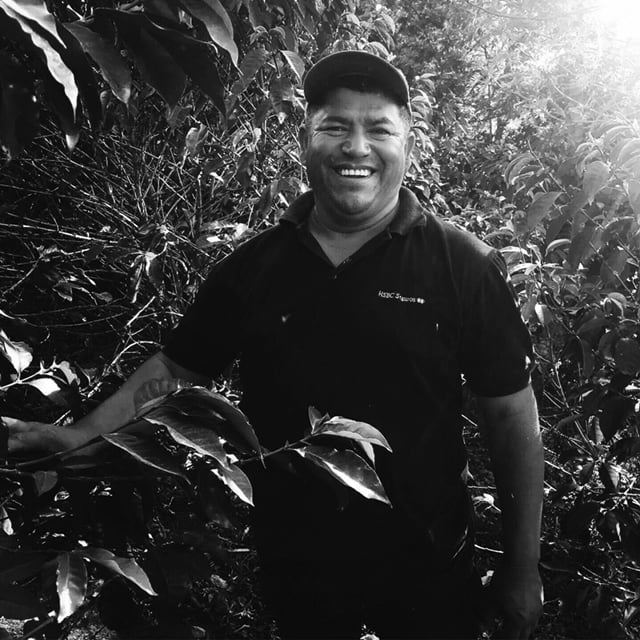
{Oscar Omar Alonzo of Finca Cual Bicicleta. photography: Dynamite Roasting}
The Coffee Belt: an imaginary band that circles the globe around the equator, encompassing all of the world’s coffee growing regions. It touches primarily on Africa, Asia, South America and Central America.
THE PLANT
“The coffee plant is an understory shrub, that naturally grew in the Red Sea area, in Ethiopia and Yemen. It’s grown, of course, into a big international industry, and plants have been exported and cultivated throughout the world for a long, long time. Like wine, coffee has different varietals, like Typica and Bourbon (both originating from Yemeni stock). The terroir, like altitude, soil quality (volcanic soil is excellent for coffee growing), humidity, rainfall, temperature, and density of the crops affect the taste of the coffee.”
‘One thing we say about coffee, flavor is always at the farm level.’
“Coffee is almost entirely grown in rural places, on sides of mountains, it trends pretty steep. It is somewhat prohibitive to have larger, factory-type farms. Although, some places, like Brazil, where the terrain is lower in altitude and a little bit easier to traverse, you can have big plantations.”
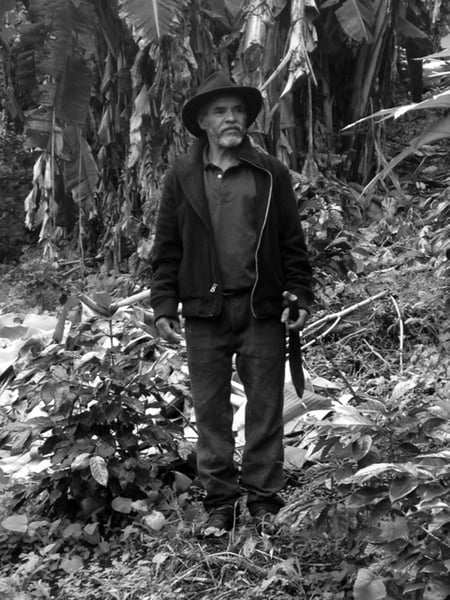
{David Chavez of Marcala, Honduras photography: Dynamite Roasting}
THE HARVEST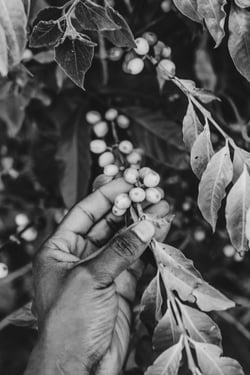
“Most coffee, is grown on small lots, small family farms, small producers – almost entirely still picked by hand. Part of that has do with lack of infrastructure. When coffee grows, it grows on a branch. It doesn’t all become ripe at the same time, so you can’t just strip off all the berries. You pick this one and this one, and then you come back the next week and pick the same tree. So all of that is fairly prohibitive for using mechanized harvesting.”
PROCESSING
“The farmer has to make some choices as to how he wants to process the beans. There’s a couple of different ways that will affect the flavor. You can have something that’s dried in the sun. It’s fruity and super sweet, or a more traditional processing called wet processing, where they take the pulp off and dry it.”
‘We spend a lot of time sourcing. That’s a big part of what we do.’
MICROLOTS
Microlot: is not just a small lot of coffee, or a larger lot divided up into smaller bags to sell. The term also means that there has been investigative and experimental input by the buyer, grower or both, to produce a coffee with special characteristics.
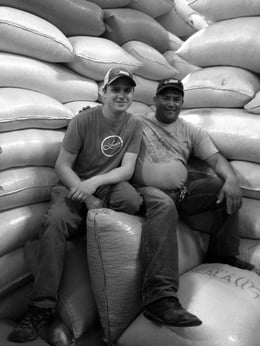 “When we do microlots, we go back to the same farmer, get the same coffee every single year, and they get a higher price for it because they take special care. We have a coffee called Finca Cual Bicicleta. The farmer’s name is Oscar Omar Alonzo from Trapiche, La Paz, Honduras. It changes every year, just like vintage wines, which is part of the fun of that coffee.
“When we do microlots, we go back to the same farmer, get the same coffee every single year, and they get a higher price for it because they take special care. We have a coffee called Finca Cual Bicicleta. The farmer’s name is Oscar Omar Alonzo from Trapiche, La Paz, Honduras. It changes every year, just like vintage wines, which is part of the fun of that coffee.
The relationships that we’ve made are my favorite part of the business. It’s been really fun to make those connections with the growers that we come back to working with every single year.
{Andy and Oscar. photography: Dynamite Roasting}
We usually take a couple of trips every year to origin, to purchase and taste and make sure everything is good. While we are there we are seeing our friends that we’ve been working with for many years. I’ve started taking my kids down to Honduras with me, so they’ve gotten to know their kids. They spent a couple days at their bi-lingual school that’s owned by the cooperative. They’ve come up to visit us a number of times. Those relationships are fun and important.”
“I take a lot of pride in supporting a local business that treats its employees like family, gives back to our local community, and builds ethical relationships with its partners worldwide, and provides a phenomenal product. A bag of Dynamite coffee is always our gift to hosts when we travel anywhere in the world – a perfect symbol of all that we love about home.” ~ DIANA McCALL, Black Mountain
BLENDS
“We have some blends as well. Our espresso blend, for instance, we want to taste the same all the time. So we may source from different regions, different farms, even different hemispheres to get what we need. Half the year we will source from Peru in the southern hemisphere, and Honduras in the northern hemisphere. They taste the same, but they come in at different times because their seasons are flip-flopped. That way, we can keep a consistent product every year.”
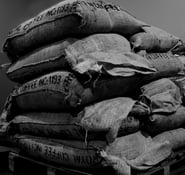
SOURCING
“As a roaster, we spend a lot of time sourcing coffees to get exactly what we want. There may be a variety year to year from the same farms. Like our coffee from Mexico – we get coffee from the same region (Chiapas, Mexico) every single year. But the quality of the lot coming from one cooperative may be different this year verses next year. So we will search around through a group of about 4 or 5 cooperatives in the same region to find what works best for us.”
ROASTING
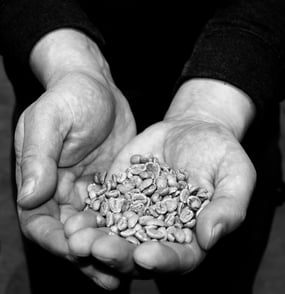
“Roasting is this really great balance of art and science. There’s a lot of chemistry going on in those coffee bins, as we heat things up there are chemical reactions and sugar development. It’s more complicated than just turning the coffee brown. You can do that and you’ll get ‘coffee,’ but we work really hard to bring out the best in all those beans. We do a lot of tasting. You can’t measure acidity, or if it has, for instance, cherries or limes. You have to taste it. We do it as a panel. Everybody gets involved from the delivery guy to the roasters – everybody has their opinions.”
PP: So, you’re creating your own roasting formula?
A: “Yep. That’s right. There are some general rules of thumb, but every roaster’s coffee is going to taste different. Lots of roasters might use the same coffee that we do, but they taste very different, just by our approach to roasting and what we’re trying to do, how dark we take it, the equipment that we’re using, etc. Each roaster has their own signature. It’s just like breweries – everybody can make an IPA, but Highland’s IPA tastes differently than Pisgah’s IPA.”
PP: What is the difference between light, medium and dark roasts?
A: “Between dark roast and light roast, the big difference is the finishing temperature. However, there are reasons why we use the coffees that we do for different roasts. Dark roast, for instance, is a blend of coffee from Honduras and Uganda. We select those coffees that roast well dark. Not all beans do. Some coffees start tasting ashy. They don’t keep their body, and just don’t taste good. Also, when you roast dark, all coffees start tasting the same. The predominant flavor you’re getting is a roasty flavor. You lose a lot of nuance in the beans, so you wouldn’t use a fancy, expensive Ethiopian coffee with a lot of fruit notes and fine floral characteristics because those would be lost and destroyed if you roasted dark. We’re looking for something that is dark and chocolatey and that takes the heat really well.
We use some of those finer, nuanced coffees for lighter roasts, that preserve that character. We use the roasting level that brings out the best in the bean. Some coffees, like our Mexico Chiapas, develops these nice chocolate notes when you develop it medium. If it’s too light, it just tastes a little bit flat. It doesn’t have that fine, crisp acidity that you might get in a lighter roast. The perfect sweet spot for that coffee is right in the medium roast, so that’s where we take it. We let the coffee dictate how they get roasted.”
‘We have a portfolio from lights to darks, but we select a coffee because we know we want to roast it a certain way.’
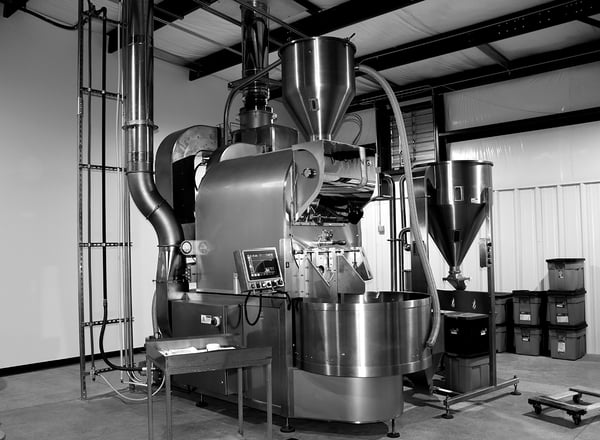
{Dynamite’s new roaster can roast 150lbs. of coffee in 15 minutes.}
DISTRIBUTION
“So, after we roast it, we sell it. We have our own café in Black Mountain. About 80% of our business is wholesale, so we sell to other businesses, restaurants, cafés, grocery stores. We work with everybody from small little markets like Common House Fly here in Black Mountain, West Village Market in West Asheville, and bigger companies: we’re in 3 Whole Foods, the Fresh Markets, and Targets here in Asheville. They are doing really great at focussing on local products. We are also in EarthFares in the eastern part of the country. We also have a strong mail order business on our website.”
THE BEGINNING
Andy tells me how he started out in beer brewing before coffee. After becoming passionate about being a home brewer, he worked for several years in different breweries both in Montana, and here in Asheville upon his arrival. His coffee roasting journey started the same way: roasting and experimenting at home. He found the freshness of just-roasted coffee “mind-blowing,” so was instantly hooked. The day arrived when he and his long-time music buddy, Josh Gibbs, saw an opportunity to fill a special niche: local roasters were few and far between at the time and hadn’t crafted a strong portfolio of roasts. So, Andy and Josh set out to do just that. With Andy’s passion for coffee, and Josh’s expertise in marketing, they created the world-class quality and branding that we all know now as Dynamite Roasting Company.
PP: What was your first farm trip, and how did you decide where to go?
A: “We had always heard of other roasters talking about direct trade, and I just love to travel. We all wanted to make those connections. We were already buying Fair Trade and organic coffee. Part of the certification for both is the ability to trace the coffee back to the farm level. The opportunity came up with one of our importers to travel with them to Honduras. They were starting this microlot program that was farmer specific, so we traveled with them and a couple of other roasters. We met with a group of farmers that we’d been buying from for a number of years. We purchased what we wanted from that trip, and then that became an annual thing.”
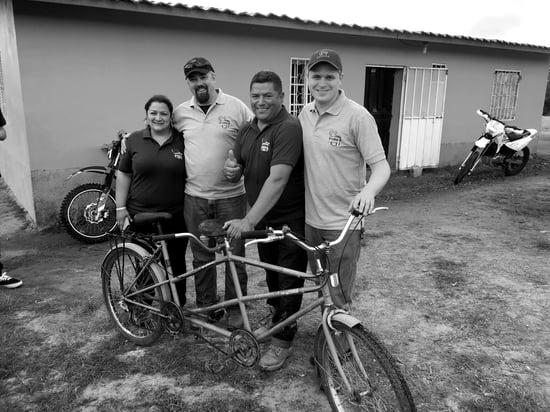
{Liliana Cardona, Josh, Oscar Omar Alonzo, and Andy. photography: Dynamite Roasting}
“Now, 9 years later, these farmers know what we are looking for. They will reserve part of their crop, knowing we are going to commit to purchasing that. So, we are getting custom grown coffees, which is great. They are really excellent, some of the best coffees I have ever had, and it’s produced just for us to our specifications. And in turn, we pay them a higher price, so they can make a much better living from those coffees than just general lot coffees. One of the really great things about this program is that we get to see this in action. We bought the first microlot that Oscar Omar Alonzo produced on his farm. It was proof to us that we could get good, consistent coffee, and it was proof to him that he could be rewarded for his effort. So now, since he knows he can rely on us purchasing every year, he can reinvest that money into his farm. We have seen him build a house on his property, developed another farm, and he also built a daycare and school for the local mountain kids. It’s a long trip down the mountain to school, so sometimes the kids make it, and sometimes they don’t. It’s great to see the direct result and benefits from that relationship.”
PP: Are they multi-generational farms?
A: “Yes, most of the time they are. Oscar’s farm was originally owned by his grandmother. Many of the farms have been passed down. One of the challenges that most coffee farms around the world have is keeping the kids on the farm. The larger, commodity coffee industry is brutal for farmers. The margins are so low and sometimes they sell the coffee for under the cost of production. So, it becomes difficult to show the kids that there is a benefit. Often, they leave for the city and the land gets abandoned. Many of the programs that we are participating in with our travel, hopefully leads to them making a living and staying. Of course, this is also self-serving because if they leave, we don’t have any coffee. But ultimately, it is creating a living that is viable for many generations to come.”
PP: Where is your favorite place to travel to get coffee?
A: “Honduras has a real place in my heart because we’ve been doing it for so long. Those relationships have become very personal, and I love the coffee there. But, every place we go is unique and different, and I learn a lot. We’ve spent some time traveling with Fair Trade in Peru. I was in Indonesia, Sumatra 2 years ago. That was mind-blowingly different. I traveled in Kenya and Rwanda 5 years ago. Africa is great. It’s a longer plane ride, so they do not get many visitors from America like Central American coffee farms do. When we went, I don’t think they had ever had roasters visit. So that was really special. They really appreciated it and pulled out all the stops: dancers, food, singing – it was amazing.”
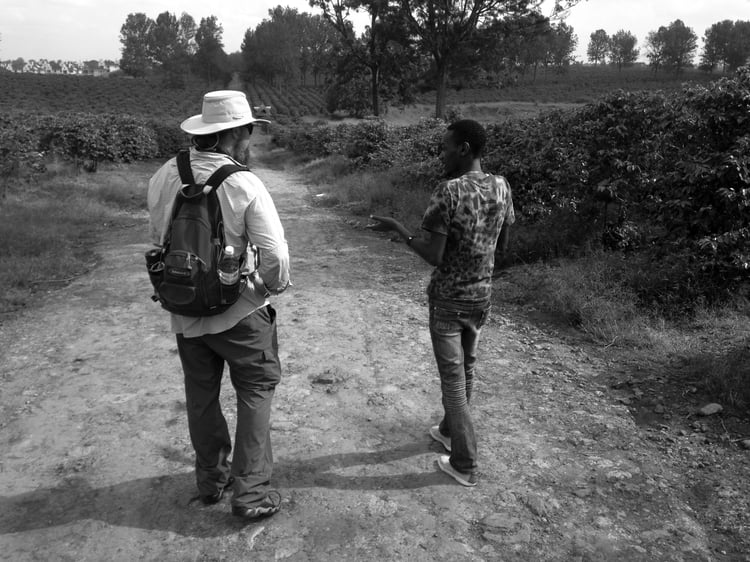
{Josh and Peter Pinchez, Kenya. photography: Dynamite Roasting}
BRINGING IT HOME
PP: How does Dynamite support and bring the local community together?
A: “Community is an over-arching theme in everything we do, whether it’s the coffee farming community, or the barista community, ... it‘s just a reflection of who we are. I‘m a Black Mountain resident. I‘ve been here for almost 20 years. My kids go to school here. This is home. We work here, my customers are part of my community. When we first started roasting, and worked in the café, I was connected to the community in a way I had never experienced before.
Josh, my business partner is an Old Fort native and has lived in Asheville his whole life.
This is a special place. Having a business allows us to support the things we love. We are a sponsor of the LEAF Festival. How awesome is that, to have that twice a year in our own backyard, with big name artists, and I can go home and sleep in my own bed. It‘s great. You don‘t get to do that most places.”
“Dynamite Roasting has always been something special. They are part of the fabric of Western North Carolina. You know someone is from WNC if they have a WNCW Radio bumper sticker and a Dynamite Roasting bumper sticker. The coffee is great, but Dynamite is more than that. Andy and Josh have played in local bands for years and years – they are the cool guys – out in the community, connecting with people and supporting events and causes like small farms, bicycle tours, music events, volunteer opportunities, and area schools. They are sweet, warm people who care – and that integrity extends to their relationships with the farmers that grow their coffee. They visit the farmers. They create friendships. They share a meal. They even play music with them. The success of Dynamite Roasting is the combination of a great product and a company built of connections and community support.” ~ JOHNNY KENNEDY, Black Mountain
“WNCW Radio is a big project we do. We‘ve been doing it for a long time. With the WNCW blend, we give back 10% of all of the sales back to the radio station. It ends up being about 7,500 bucks a year. So, people support the radio station by buying the coffee, and we send them a check every year. That is part of what makes this community unique. As a musician, I love the music they play. And, they play the bands that I play in. They play The Egg Eaters for goodness sakes!
Giving back is easy. Like, we give our spent coffee grounds and chaff to the community garden in Black Mountain, and excess coffee to Bounty and Soul – what a special organization that is. Making coffee for Teacher Appreciation Day for public school teachers – I mean, that’s a no-brainer.
We don‘t do these things for business reasons, but when you support the community, the community supports you. They help us by buying our products, and in turn, we are more successful and can support the community. It’s a big circle, and I love that this community recognizes that – that you‘ve got to support the things that you love, or they won‘t exist. It’s true for your public radio, or your local coffee roasting business.
As we enter this adventure with our new large roasting machine and facility, we have to justify them. We hope our company will grow so we can support all these things we love. And then we can buy more coffee from our coffee farmer friends. Along this new path, we will also be hiring more people, and so the cycle continues.”
{Andy Gibbon and Josh Gibbs. photography: Dynamite Roasting}
and finally, on doing what you love
PP: How has Platinum Group helped you to Do What You Love?
A: “Platinum Group has been, especially during this pandemic, a central part of what we do. We’re artisans, we are coffee roasters, not business people. We have some natural business ability based on good intentions and love for our product, but we don’t know anything about taxes. I don’t want to know about S Corps, HR, payroll, etc. I love coffee. That’s what I do. And that’s what Platinum does both through payroll and accounting. They serve as our make-shift HR department as well. They are the team of experts that handles everything we don’t know how to do.
And, the COVID webinars – I have sat in on every single one since the beginning. They have been essential to navigating PPP. And, bringing in the lawyers groups – not only could we not afford personal legal consultation for all of the issues dealing with the pandemic, we wouldn’t know what questions to ask in the first place.
What Platinum Group does for us is really essential in this new era.”
Platinum Group is an HCM Payroll & Accounting firm in Asheville that celebrates our wonderful clients, keeping business local, and elevating our community by volunteer outreach. To see how we can support your business, visit us at: www.platinum-grp.com


